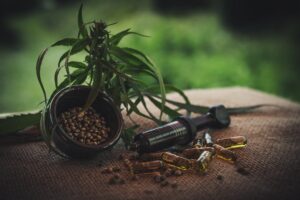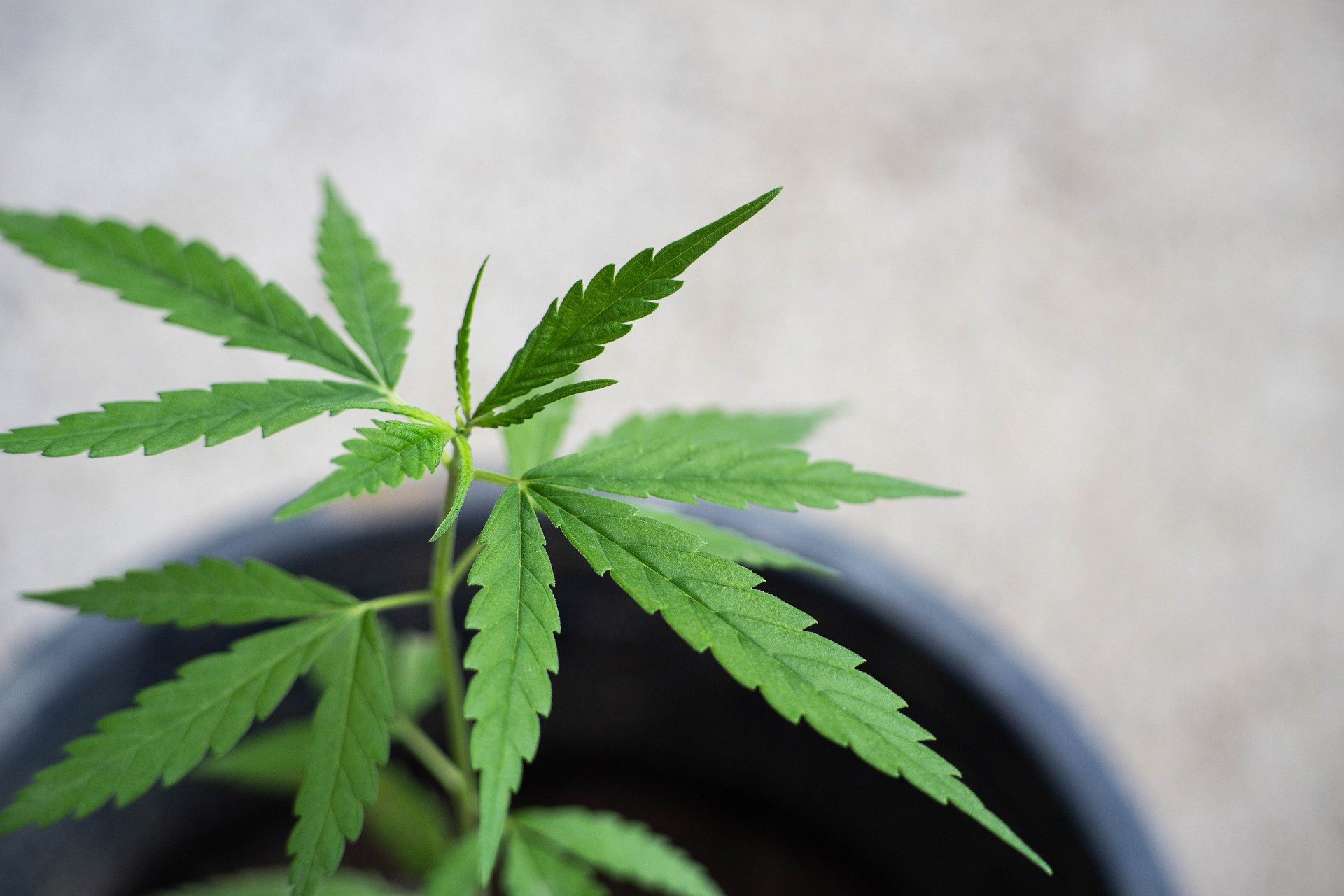One year ago, we published the article below on “5 Reasons Why CBD is Such a Big Deal.” A lot has changed since then.
The FDA has clarified that CBD can’t be added to food products or marketed as a dietary supplement. They’ve cracked down on some CBD sellers who marketed products as having medical benefits or encouraged them for use in pets or children.
Additionally, some farmers had difficulty selling their hemp crops, or had to sell them at a loss, due to a lack of processing infrastructure and an influx of new growers. Plus, many more people have begun to experiment with CBD and learn more about how to use it or if it’s beneficial for them.
So now, one year later, what do you think? Is CBD still a big deal for the reasons outlined below? Are there other reasons it’s even more significant today than it was at this time last year? Or was some of the hype just that—hype? Share your thoughts with us in the comments below!
_________________
CBD has skyrocketed in popularity. But why is it such a big deal? And is the hype real? Check out these 5 reasons why CBD has everyone so excited.

Image by Nicky • 👉 PLEASE STAY SAFE 👈 from Pixabay
I grew up in Southern California. There, it seemed like smoking cigarettes was a capital crime while smoking pot was a virtue. Everyone I knew was whole-heartedly in favor of legalizing marijuana.
Marijuana didn’t make people mean or crazy like alcohol. It made people happy and relaxed. Plus, if legalized, it would create new jobs and cut out all those crime-fighting costs. Not to mention the fact that it would eliminate risks to buyers forced to get their marijuana from shady drug dealers. At least, those were the arguments.
The Legacy of Tobacco
Now, many years later, I live in North Carolina. Around here, smoking is sacred because this place is tobacco territory. Even though tobacco fields are becoming rare, the nostalgia of the “good old days” raising tobacco is ever present.
You May Also Enjoy:
“Are CBD Oil and Hemp Oil the Same Thing?”
“A History of Kratom: Medicine, Murder, and Political Intrigue”
That’s because tobacco was a crop that farmers could actually make a living growing. The demand was high, the yields were good, and the profit margins made sense. Even small farmers could grow tobacco without huge investments in equipment.
Big Deal #1: Hemp Might Be the New Tobacco
Hemp, particularly when grown for CBD, has many farmers feeling like they might have a chance at making ends meet again. Like tobacco, it’s a crop with the potential to earn farmers enough profit to keep from going under.
In other words, it’s a high-value specialty crop and prices aren’t set absurdly low by artificial commodity trading markets. Even small farmers might be able to etch out a living growing hemp.
So, if you ask me why CBD is such a big deal, the first thing I think of is farmers. Whether hemp really will be a good cash crop for farmers is not certain. But, I certainly would like to see small and family farmers get to earn a decent living again.
Big Deal #2: CBD with Less THC
Then, right after farming, I think of those ordinary people I knew in California who had to work with drug dealers to get a bit of relief from daily life or whatever pained them.
Now, I know that marijuana and hemp for CBD aren’t the same thing. But I grew up in Southern California long before medicinal marijuana was even remotely legal. People were growing half-wild plants that had moderate THC-to-CBD ratios. This stuff wasn’t raised in labs. It was grown in sunny, remote backyards.
According to researchers who have been tracking the potency of illicit marijuana1)https://www.ncbi.nlm.nih.gov/pmc/articles/PMC4987131/ since 1995:
Overall, the potency of illicit cannabis plant material has consistently risen over time since 1995 from approximately 4% in 1995 to approximately 12% in 2014. On the other hand, the CBD content has fallen on average from approximately 0.28% in 2001 to <0.15% in 2014, resulting in a change in the ratio of THC to CBD from 14 times in 1995 to approximately 80 times in 2014.
In other words, backyard pot used to have more CBD with less THC, making it more about relaxation and anxiety relief than about getting high. A lot of people see commercially available CBD as a way to get back to those relaxation and mind-easing benefits that came from less potent marijuana.
TGN now carries extremely high-quality, medicinal-grade CBD herb. This bulk herb is intended for making salves, tinctures, and lotions, although you could smoke it (its quality is that high). I’ve met with the farmer personally, and it’s grown to “beyond organic” standards, although it’s not officially certified. Click here to buy medicinal-grade CBD herb.
Legal Warning!
Those two reasons are just the tip of the iceberg on why CBD is poised to become a $20 billion+ business in just a few years. We’re about to look at a few more reasons why CBD use has sky-rocketed. Before we do, though, let me just note, none of what follows is an endorsement for these applications of CBD.
The FDA has clearly stated that making any claims of efficacy or health benefits related to CBD is against the law. As such, what follows is simply an exploration of why CBD has become so popular so quickly.
Big Deal #3: Opioid Crisis

Image by Steve Buissinne from Pixabay
I don’t know anyone whose life has not been affected in some way by the opioid crisis. Ordinary people went to visit their doctors for pain relief. There they were given a prescription for legal drugs that have now been proven so addictive they led to debilitating addiction and/or acted as a gateway to illicit drugs.
Now fast-forward to the present. The US government’s drugabuse.gov site says:
- Roughly 21% to 29% of patients prescribed opioids for chronic pain misuse them.
- Between 8% and 12% develop an opioid use disorder.
- An estimated 4% to 6% who misuse prescription opioids transition to heroin.
Now, don’t blame the doctors. They were told by pharmaceutical companies that opioids were safe and non-addictive. Then, they were told they were safe, but extra precautions were required to prevent addiction. Then, they were told that new formulations were required to reduce the risk of addiction.
Meanwhile, doctors had to continue treating patients already addicted to opioids without tools to manage the addiction or alternative pain remedies. Yes … there were cases of abuse by some doctors and there was over-prescribing. But those doctors were in the minority.
You May Also Enjoy:
“How to Choose CBD: Full-Spectrum, Broad-Spectrum, or Isolates”
“A No-Nonsense, Illustrated Guide to 49 Botanical Terms”
“3 Hidden Dangers of Buying CBD and 3 Simple Ways to Protect Yourself”
Also, the FDA2)https://www.fda.gov/media/85029/download, the primary policing body of prescription drugs, approved various opioid formulations as safe in 1995, 2010, 2011, 2013, 2015, 2016, and 2017. The FDA has also been simultaneously involved in ongoing opioid fact-finding and addiction management–related activities from 2000 onward.
So, now we are in the middle of an opioid crisis impacting families and communities everywhere. And we are trying to find ways to both manage pain and manage addiction. Enter CBD.
According to an article on Psychiatric Times3)https://www.psychiatrictimes.com/substance-use-disorder/cannabinoids-chronic-pain-opioid-alternative:
The cannabinoids, particularly cannabidiol (CBD), have been hailed as non-addictive solutions to using escalating doses of opioids for chronic pain because cannabinoids potentiate the efficacy and reduce tolerance to opioids, although 10% of people who use tetrahydrocannabinol (THC) become addicted to it.
Furthermore:
This potential for a reduced need for opioids has been further encouraged by early epidemiological data indicating that opioid overdoses and abuse have been significantly lower in states that have legalized cannabinoids.
Now, before you get too excited about these claims, that article is actually about the challenge of managing CBD use given that these claims are not yet substantiated. It also further goes on to say that the early data about lower opioid overdoses in states where marijuana is legal may have been premature.
Learn how to grow your own cannabis and use it to make powerful remedies in our in-depth master class, Cultivating Cannabis. Click here for details!
Yet, the fact that CBD is believed to have potential efficacy to reduce opioid dependence4)https://www.webmd.com/mental-health/addiction/news/20190521/could-cbd-treat-opioid-addiction is one key reason why CBD is considered such a big deal.
Big Deal #4: Chronic Pain Epidemic
The underlying reason, though, that we are in an opioid crises is that chronic pain is the new norm. According to that same drugabuse.gov site:
Chronic pain affects an estimated 100 million Americans5)https://www.drugabuse.gov/related-topics/pain, or one third of the U.S. population, and it is the primary reason Americans are on disability.
Even if you aren’t an opioid user looking for a way to reduce your dependence, the lure of a pain management product that is not currently considered addictive (except if it contains THC) is highly attractive.
Although everyone who is paying close attention to the research will tell you that there’s still a lot we don’t know about CBD, some studies do indicate pain-relief potential.
Here are some examples.
- There was a 2015 study6)https://www.ncbi.nlm.nih.gov/pubmed/26517407 that showed “[t]ransdermal cannabidiol reduces inflammation and pain-related behaviours in a rat model of arthritis.” Additionally, the study notes that CBD does this “without evident side-effects.”
- A study in 20127)https://www.ncbi.nlm.nih.gov/pmc/articles/PMC3371734/#__ffn_sectitle found that “[c]annabinoids suppress inflammatory and neuropathic pain by targeting α3 glycine receptors.”
- A cross-sectional survey of CBD users8)https://www.ncbi.nlm.nih.gov/pmc/articles/PMC6043845/#__ffn_sectitle, published in 2018, found that “CBD is being used as a specific therapy for a number of diverse medical conditions—particularly pain and inflammatory disorders.” The survey also showed that people reported that CBD did treat their conditions “effectively in the absence of conventional medicine and with nonserious adverse effects.”
I wish I could give you a longer list. But the reality is that CBD was mostly illegal until the 2014 farm bill made it marginally legal for research purposes. Then, in 2018 states were given the rights to regulate industrial hemp production under certain conditions.
Studies take time to set up, years to gather data, and then those results must be peer reviewed. They also have to be paid for by someone. Now that CBD is something you can easily buy, without a prescription, there’s little incentive for deep-pocketed pharmaceutical companies to fund expensive studies.
There are also studies being conducted related to multiple sclerosis and cancer treatment. There are also studies in the works related to THC with CBD in the medical marijuana realm. The FDA has also approved a high-dosage CBD product for the treatment of epilepsy.
You May Also Enjoy:
“10 Incredibly Powerful Antiviral Herbs”
Unfortunately, there just aren’t a lot of human-trial studies on CBD as an all-purpose pain relief tool. Also, like other plant medicines people use at home, CBD is becoming less and less likely to get the scientific scrutiny it deserves.
Instead, the majority of the research on CBD for pain is going on in homes all over the US and other parts of the world. Consumers using CBD at home to self-treat for pain are like a living laboratory for the efficacy of CBD.
At this point, the best human-trial data out there is that CBD users are self-reporting they find it effective for treating pain. The challenge with that kind of data is that we don’t know how much or how often they are using it. We don’t know what formulations are proving most effective. We also don’t know if they are taking other medications with CBD or what specific conditions it is treating.
Bottom line, though, is that there are enough people experiencing pain relief from CBD that it is driving the hype and demand.
Big Deal #5: Illicit History

Image by Julia Teichmann from Pixabay
Let’s face it: Another big reason why CBD is such a big deal is the illicit history behind its legalization. Basically, hemp and marijuana were things that people grew as a matter of right. Suddenly those rights were taken away. Then, through a series of legislation tightening, access to cannabis became completely illicit.
Now, suddenly, you can buy all sorts of hemp and CBD products online or at your local drugstore without a prescription. A right was taken from us, people went to jail over breaking those rules, and then suddenly hemp is OK again. It’s kind of like Prohibition. And that history just adds a certain kind of novelty and frenzy to the whole CBD phenomena.
You May Also Enjoy:
“15 Natural Antibiotic Alternatives”
“9 Benefits of Kratom: A Natural Alternative to Opioids and Mood Enhancers”
There are still questions on the legality of CBD, particularly related to adding it to food products, marketing it as a dietary supplement, and making any claims about its efficacy. However, on that front, a bill was recently proposed in Congress that would give CBD the same status as a dietary supplement.9)https://www.congress.gov/bill/116th-congress/house-bill/5587/actions?KWICView=false So, perhaps down the road, taking CBD will be as normal as taking Vitamin D.
What Do You Think?
The really big question, though, is: Is CBD a big deal to you? Since there isn’t a whole lot of research on how the doses people are taking at home impacts their experience of pain, it really comes down to what you think about CBD.
Is it a big deal? Is it over-hyped? Do you have reservations or are you entirely in favor? Please share your thoughts with our community of readers using the comments section below.
__________
This is an updated version of an article that was originally published on February 28, 2020.

The Grow Network is a global network of people who produce their own food and medicine. We’re the coolest bunch of backyard researchers on Earth! We’re constantly sharing, discovering, and working together to test new paths for sustainable living—while reconnecting with the “old ways” that are slipping away in our modern world. We value soil, water, sunlight, simplicity, sustainability, usefulness, and freedom. We strive to produce, prepare, and preserve our own food and medicine, and we hope you do, too!
References
| ↑1 | https://www.ncbi.nlm.nih.gov/pmc/articles/PMC4987131/ |
|---|---|
| ↑2 | https://www.fda.gov/media/85029/download |
| ↑3 | https://www.psychiatrictimes.com/substance-use-disorder/cannabinoids-chronic-pain-opioid-alternative |
| ↑4 | https://www.webmd.com/mental-health/addiction/news/20190521/could-cbd-treat-opioid-addiction |
| ↑5 | https://www.drugabuse.gov/related-topics/pain |
| ↑6 | https://www.ncbi.nlm.nih.gov/pubmed/26517407 |
| ↑7 | https://www.ncbi.nlm.nih.gov/pmc/articles/PMC3371734/#__ffn_sectitle |
| ↑8 | https://www.ncbi.nlm.nih.gov/pmc/articles/PMC6043845/#__ffn_sectitle |
| ↑9 | https://www.congress.gov/bill/116th-congress/house-bill/5587/actions?KWICView=false |









COMMENTS(6)
Thank you Tasha! Great article! CBD is a big deal. And I love TGN’s quality control! I’m definitely going to pick some up for use in my herbal practice.
I have been using CBD oil for about three years to manage the huge amount of inflammation in my body due to antibiotics being prescribed because no one could figure out what was going on with me. Turned out it was mononeucleosis which you’re not supposed to get again once you have had it. It’s caused by a virus, so the meds were useless and just decimated my microbiome, which is what caused the debilitating inflammation and pain.
It took two years and a Functional Medicine doctor to get me well again. The lingering pain is nicely managed now by the CBD oil I’m taking but I had to try four different companies before I found something that worked for me. Unfortunately, what I purchased from the Grow Network did not help and I’m grateful that I could get a refund for that.
We need research into what strains of CBD work for different problems, but until then, trial and error is all we can do. I live in Georgia where it’s still somewhat frowned upon, so it was difficult to find products. Thankfully, that is slowly changing now.
Barbara – Thank you so much for sharing your experience. I am glad you finally got the help and answers you needed. New developments this week seem to suggest the FDA is working toward allowing CBD to be marketed as a dietary supplement. If that happens, then states might be more likely to follow suit and make purchases easier and safer for all the people like you who benefit from CBD. Best to you! Tasha
Thanks for reading Scott! Let us know how it goes in your herbal practice!
A well written and informative article. My husband and I are using a low-dose CBD via a transdermal patch and have found it to be very helpful dealing with stiffness after exercise. Stiffness was experienced post cycling, playing pickleball, and kickboxing. We are obviously active and wish to remain that way. One of us has arthritis in major joints and the CBD patches work nicely when placed nearby a particular joint as needed. The longer we regularly use CBD, it seems we do not need to place a patch near any particular area – just apply anywhere convenient and the body absorbs and distributes the CBD.
Jane – Thanks for sharing your experience. I took my dad to see his nurse practitioner this week for his annual check up. I noticed she was selling CBD. So, I asked her what her patients were using it for. She said her husband started using it for arthritis and he convinced her to carry it at her practice. She said most of her patients that use it see benefits with arthritis, anxiety, and sleep problems. She also said it seems to be more effective for people who use it regularly than those who use it once in a while. So, maybe our bodies do become adapted to receiving it and putting it to good use. Thanks for reading!
Also, thanks to you, I now know what pickleball is. Headlines say its “the fastest growing sport you’ve never heard of.” Tasha